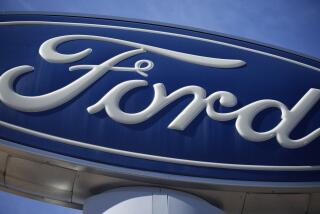GM to Change Hughes Merger Bookkeeping
General Motors has agreed to change the way it will account for its acquisition of Hughes Aircraft, a move that could raise the cost of the $5.2-billion deal but also allows the deal to proceed toward final approval by GM shareholders.
Officials of the giant auto maker said Tuesday that they have agreed to comply with a Securities and Exchange Commission request that as much as $4 billion of the purchase price be charged against the earnings of a new subsidiary, GM Hughes Electronics, that GM is creating to hold Hughes Aircraft.
GM had wanted to charge that cost against the earnings of the entire parent company, where it would have a much smaller effect because it would be offset by a much larger earnings base.
By lowering the earnings of the new subsidiary, the charge also could depress the price of a new, publicly traded stock of the subsidiary that GM is issuing under a novel arrangement to help pay for the acquisition. That could force GM to pay a higher dividend on the stock or pay out additional cash to the Howard Hughes Medical Institute, which agreed to sell Hughes Aircraft in June.
‘Take the Edge Off’
“It will take the edge off the market,” said David Healy, auto analyst at Drexel Burnham Lambert, who said the subsidiary’s earnings could be reduced by about 20%. But top officials at GM and the SEC said the change will probably not affect the price of the stock because GM still plans to pay the same dividend on the stock regardless of the accounting change. The GM official, who asked not to be identified, said the dividend pay-out ratio will be about 25% of earnings, excluding the acquisition cost.
In addition, GM plans to explain the earnings reduction in its financial reports and include a figure showing what profit would be without the charge.
“We acquiesced (to the SEC) for the sake of harmony,” the GM official said, adding that the change “adds a touch of confusion but has no economic effect.”
“This puts a bit more burden on GM to make it loud and clear that earnings are not as bad as they look,” said Scott Merlis, auto analyst with Shearson Lehman Bros.
But, he said, “these days, investors are smart enough to look beyond clearly rigged accounting ploys and get to the nitty-gritty cash numbers.”
An official of the medical institute suggested that the accounting change might have only a minimal effect.
No Significant Impact
“Our preliminary guess is that it will not have a significant impact, but we’re still studying it, so we are really not in (a) position to make a final judgment yet,” said David J. Taylor, the institute’s vice president and general counsel.
Under the acquisition, GM will pay the medical institute $2.7 billion in cash and give it 50 million shares of the new GM Hughes subsidiary stock, to be called class H stock. Another 15 million shares of the class H stock will be issued to GM shareholders, another 5 million will be sold in a public offering and the remaining 130 million shares will be held by GM.
The SEC’s concern centers around an accounting concept called “goodwill,” which is the premium that GM is paying for Hughes above the aerospace firm’s net worth plus the restated value of assets that are carried on the books at less-than-market value. The goodwill is between $2 billion and $4 billion, a source close to the deal said.
GM wanted to apply this goodwill cost to the consolidated earnings of the parent. But SEC Chief Accountant Clarence Sampson told GM that the goodwill cost must also be applied to the earnings of the new GM Hughes subsidiary, and GM backed down.
A source close to the deal said profits of the new GM Hughes unit will be reduced by as much as $100 million after the goodwill is deducted. GM Hughes would earn net income of about $360 million in 1985 as a result of the SEC ruling, rather than $460 million, the source said.
That could reduce earnings per share on the GM Hughes stock to $1.80 from $2.30. That in turn could depress the initial stock price to around $18 from $23, assuming that the issue sells at 10 times earnings, as analysts estimate.
If the price of GM Hughes stock does not exceed $60 per share within three years, GM would be forced to pay additional cash to the medical institute under its acquisition agreement. GM has guaranteed that the 50 million GM Hughes shares held by the medical institute will be worth at least $60 per share in three years. Of that $60 per share, GM said it will pay up to $40 per share, or $2 billion, to the institute.
Resolution of the accounting issue apparently clears the way for the acquisition to move forward to its last major hurdle, approval by GM shareholders. Officials close to GM and Hughes said they expect the proxy materials for the shareholder vote to be ready within one or two weeks, with the acquisition to be completed by year-end.
More to Read
Inside the business of entertainment
The Wide Shot brings you news, analysis and insights on everything from streaming wars to production — and what it all means for the future.
You may occasionally receive promotional content from the Los Angeles Times.










